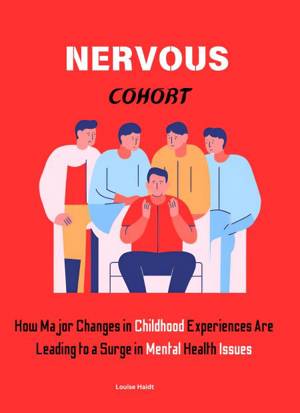
- Retrait gratuit dans votre magasin Club
- 7.000.000 titres dans notre catalogue
- Payer en toute sécurité
- Toujours un magasin près de chez vous
- Retrait gratuit dans votre magasin Club
- 7.000.0000 titres dans notre catalogue
- Payer en toute sécurité
- Toujours un magasin près de chez vous
Nervous Cohort: How Major Changes in Childhood Experiences Are Leading to a Surge in Mental Health Issues EBOOK
Louise HaidtDescription
Childhood has changed dramatically in the last few decades, changing young people's expectations and experiences. This generation is characterized by extraordinary levels of anxiety and mental health difficulties because of the fast growth of technology, increased academic pressure, and changing family dynamics of this century. The phrase "nervous cohort" captures the generalized anxiety and uneasiness that permeates today's youngsters.
The panorama of childhood has changed dramatically due to the pervasiveness of digital technology. Children are raised in a digital age when screens are a big part of everyday life. Children's play, learning, and interaction have changed as a result of the widespread use of computers, tablets, and smartphones. These gadgets have many advantages, such information and educational resource access, but they also have a lot of disadvantages. Constant connectedness and information overload can cause problems for growing minds, including reduced attention spans, sleep disruptions, and a dependence on digital validation for self-worth. Particularly social media has expanded the scope of cyberbullying and social comparison, worsening the mental health problem among youth.
In a society where success is frequently determined by one's academic performance, academic expectations have increased. Children are put on a path from a young age that expects perfection for extracurricular activities, college admissions, and standardized test scores. A culture of overachievement where stress and burnout are frequent has resulted from the constant pursuit of academic excellence. Children's mental health is frequently compromised by the increasing expectations placed on them by their parents, teachers, and society at large. Anxiety flourishes in an atmosphere where performance is prioritized over failure or introspection.
The modern family has changed as well, having a big impact on what it was like growing up. The prevalence of single-parent families, dual-income households, and high divorce rates has changed the nature of conventional support networks. Children frequently have to navigate complicated family relationships where parents may not have as much time or attention as they would want because of work or other obligations. Anxiety and feelings of insecurity can be exacerbated by the lack of a secure and caring environment. Furthermore, the importance of community and extended family support has decreased, depriving many children of the wider network of care that earlier generations were able to access.
Spécifications
Parties prenantes
- Auteur(s) :
- Editeur:
Contenu
- Langue:
- Anglais
Caractéristiques
- EAN:
- 9798227652737
- Date de parution :
- 02-09-24
- Format:
- Ebook
- Protection digitale:
- /
- Format numérique:
- ePub

Les avis
Nous publions uniquement les avis qui respectent les conditions requises. Consultez nos conditions pour les avis.






